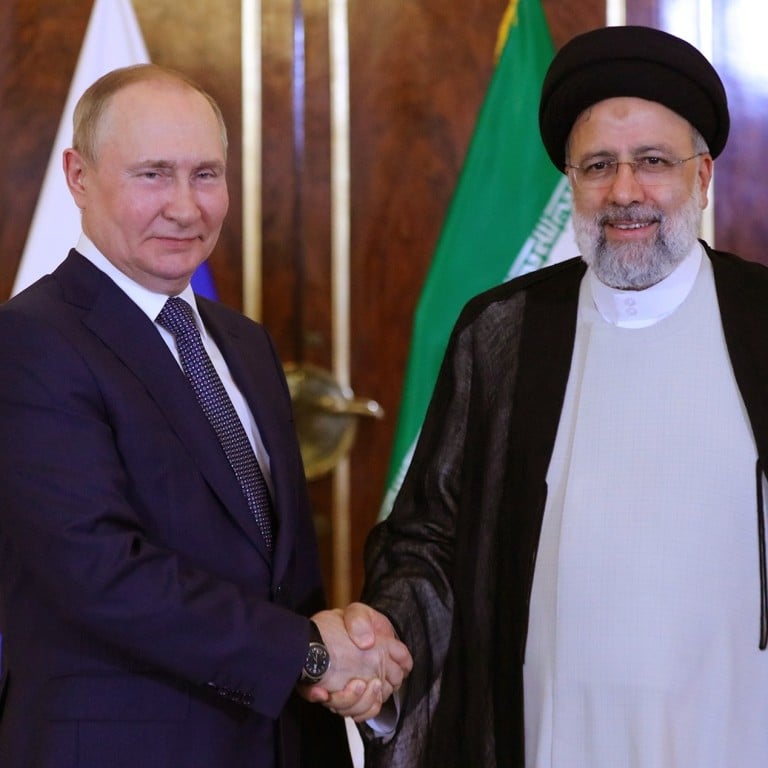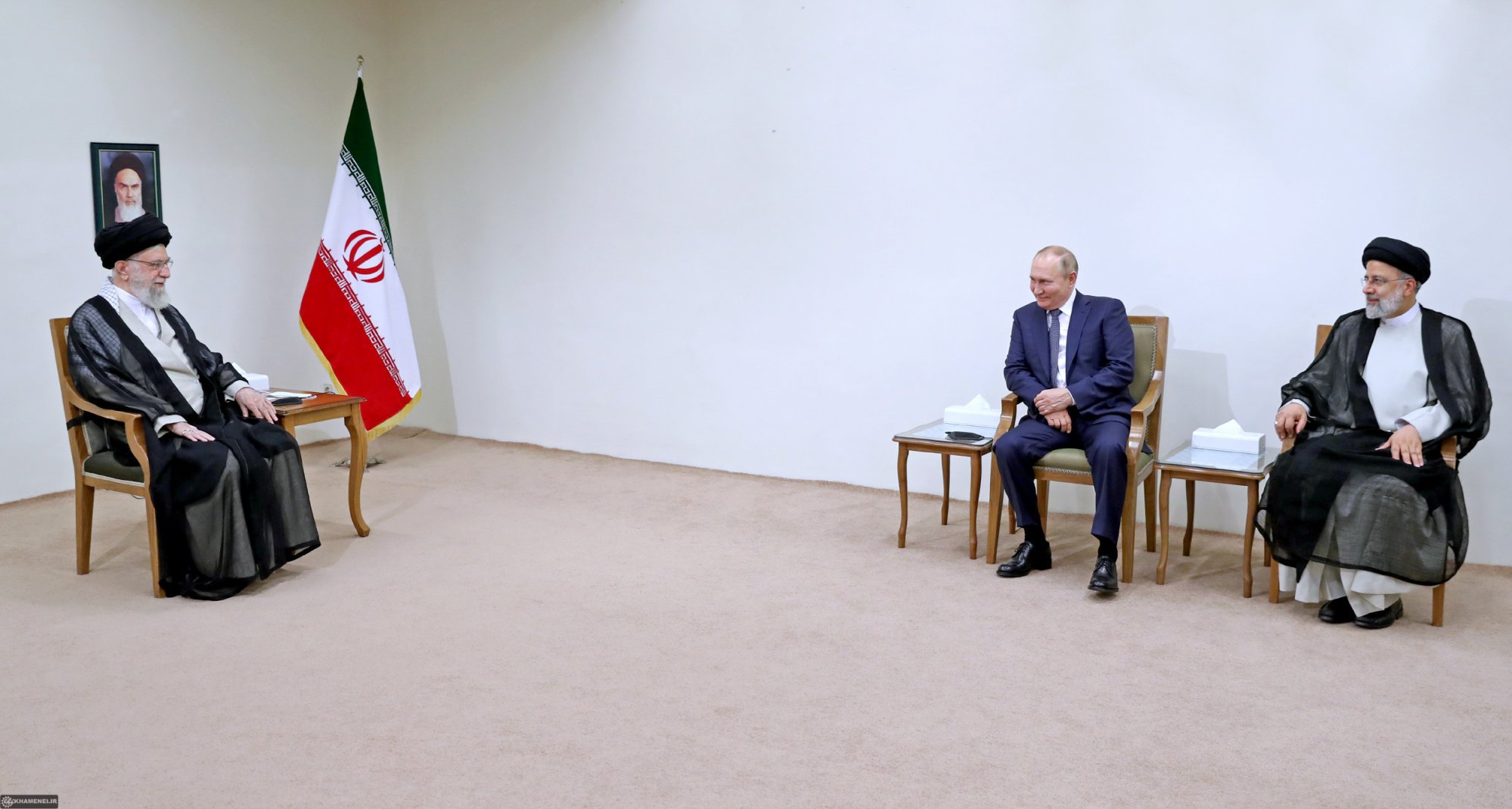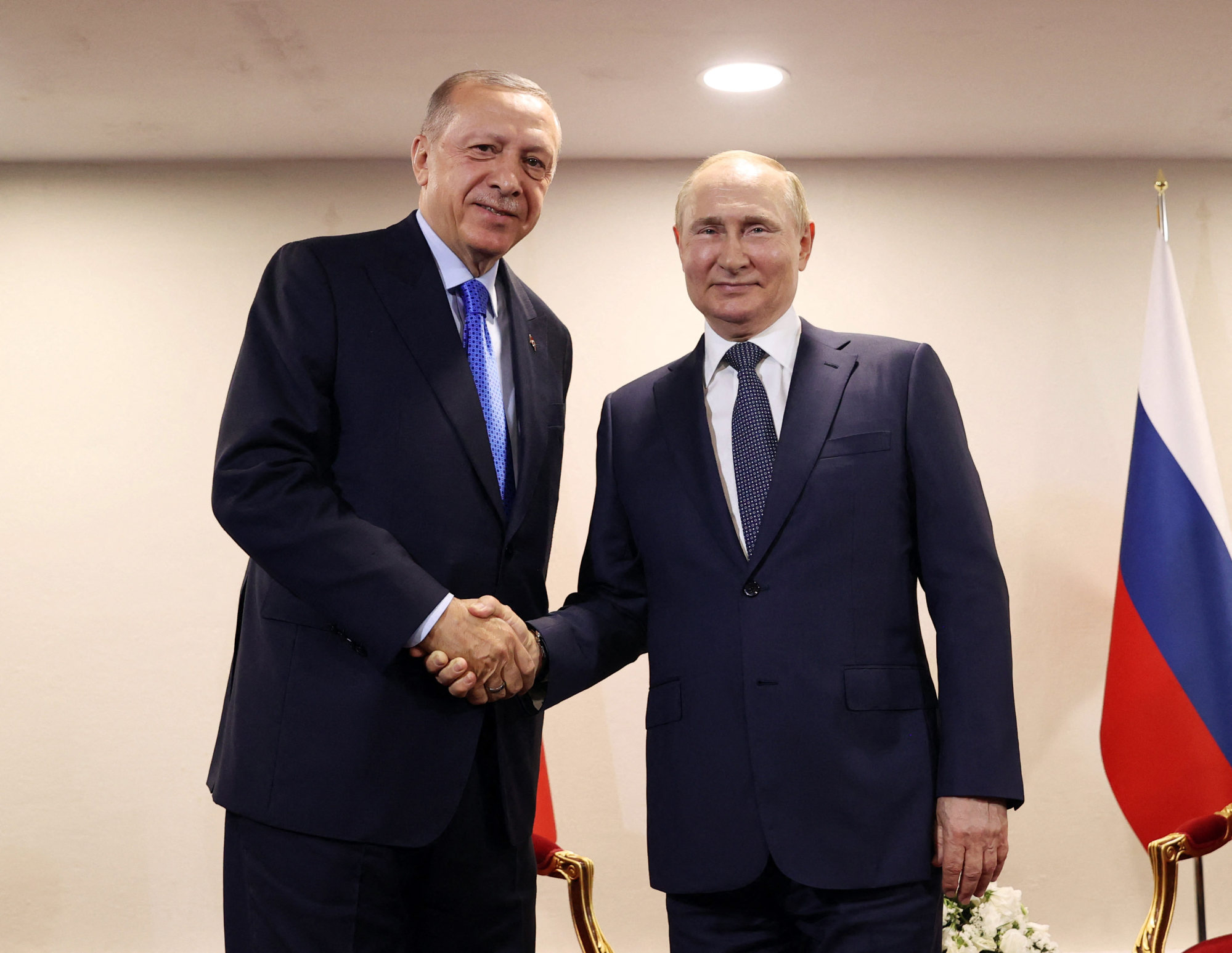
Vladimir Putin visits Iran on first trip outside former USSR since Ukraine war began
- In Tehran, the Russian leader is also meeting Türkiye’s Erdogan to discuss a Ukraine grain deal and the situation in Syria
- Putin’s trip sends a strong message about Moscow’s plans to forge closer strategic ties with Iran, China and India in face of Western sanctions
Russian President Vladimir Putin held talks with Supreme Leader Ayatollah Ali Khamenei in Iran on Tuesday, the Kremlin leader’s first trip outside the former Soviet Union since Moscow’s February 24 invasion of Ukraine.
During his visit to Tehran, Putin also held his first face-to-face meeting since the invasion with a Nato leader, Türkiye’s Recep Tayyip Erdogan, to discuss a deal that would resume Ukraine’s Black Sea grain exports as well as peace in Syria.
Putin’s trip, which comes just days after US President Joe Biden visited Israel and Saudi Arabia, sends a strong message to the West about Moscow’s plans to forge closer strategic ties with Iran, China and India in the face of Western sanctions.
Footage of Putin’s meeting with Khamenei showed the Russian leader and Iranian President Ebrahim Raisi sat together a few metres from the Supreme Leader, in a spartan white room. Only an Iranian flag and a portrait of revolutionary leader Ayatollah Khomeini could be seen in the background.
“The contact with Khamenei is very important,” Yuri Ushakov, Putin’s foreign policy adviser, told reporters in Moscow. “A trusting dialogue has developed between them on the most important issues on the bilateral and international agenda.”
“On most issues, our positions are close or identical.”
Tehran is a fellow target of severe US sanctions and a potential military and trade partner. In recent weeks, Russian officials visited an airfield in central Iran at least twice to review Tehran’s weapons-capable drones for possible use in Ukraine, the White House has alleged.
But perhaps most crucially, the Tehran trip offers Putin a chance for a high-stakes meeting with Erdogan, who has sought to help broker talks on a peaceful settlement of the Russia-Ukraine conflict, as well as help negotiations to unblock Ukrainian grain through the Black Sea.
Türkiye has found itself opposite Russia in bloody conflicts in Syria and Libya. It has even sold lethal drones that Ukrainian forces have used to attack Russian troops. But Türkiye has not imposed sanctions on the Kremlin, making it a sorely needed partner for Moscow. Grappling with runaway inflation and a rapidly depreciating currency, Türkiye also relies on the Russian market.
Speaking to Erdogan at the start of their meeting, Putin thanked him for his mediation to help “move forward” a deal on Ukrainian grain exports. “Not all the issues have been resolved yet, but it’s good that there has been some progress,” Putin added.
Erdogan praised what he described as Russia’s “very, very positive approach” during last week’s grain talks in Istanbul. He voiced hope a deal will be made, and “the result that will emerge will have a positive impact on the whole world”.
The trip to Tehran has symbolic meaning for Putin’s domestic audience as well, showing off Russia’s international clout even as it grows increasingly isolated and plunges deeper into confrontation with the West. It comes just days after Biden visited Israel and Saudi Arabia – Tehran’s primary rivals.

From Jerusalem and Jeddah, Biden urged Israel and Arab countries to push back on Russian, Chinese and Iranian influence that has expanded with the perception of America’s retreat from the region.
It was a tough sell. Israel maintains good relations with Putin, a necessity given Russian presence in Syria, Israel’s northeastern neighbour and frequent target of its air strikes. Saudi Arabia and the United Arab Emirates have declined to pump more oil beyond a plan approved by their energy alliance with Moscow.
But all the countries – despite their long-standing rivalries – could agree on drawing closer to counter Iran, which has rapidly advanced its nuclear programme since former US president Donald Trump abandoned Tehran’s atomic accord with world powers and reimposed crushing sanctions. Talks to restore the deal have hit a deadlock.
Backed into a corner by the West and its regional rivals, the Iranian government is ramping up uranium enrichment, cracking down on dissent and grabbing headlines with optimistic, hard-line stances intended to keep the Iranian currency, the rial, from crashing.
“Both our countries have good experience in countering terrorism and this has provided much security to our region,” Raisi said after talks with Putin. “I hope your visit to Iran will increase cooperation between our two independent countries.”
Emboldened by high oil prices since the Ukraine war, Iran is betting that with Russia’s support it could pressure Washington to offer concessions for the revival of the 2015 nuclear deal.
However, Russia’s increased tilt towards Beijing in recent months has significantly reduced Iran’s crude exports to China – a key source of income for Tehran since US President Donald Trump reimposed sanctions in 2018.
In May, Reuters reported that Iran’s crude exports to China have fallen sharply as Beijing favoured heavily discounted Russian barrels, leaving almost 40 million barrels of Iranian oil stored on tankers at sea in Asia and seeking buyers.

Ahead of Putin’s arrival, the National Iranian Oil Company (NIOC) and Russian gas producer Gazprom signed a memorandum of understanding worth around US$40 billion.
High on the agenda in Tuesday’s trilateral talks that will also include Türkiye will be efforts to reduce violence in Syria, where Erdogan has threatened to launch more military operations to extend 30km (20-mile) deep “safe zones” along the border. Moscow and Tehran both oppose any such action by Türkiye.
“Maintaining the territorial integrity of Syria is very important, and any military attack in northern Syria will definitely harm Turkey, Syria and the entire region, and benefit terrorists,” Khamenei told Erdogan.
Erdogan said terrorism remained a common concern and threat for Iran and Türkiye, and the two countries needed to wage a battle against all threats, including Kurdish fighters in Türkiye, Syria and Iran considered terrorists by Ankara.
Any Turkish operation in Syria would attack the Kurdish YPG militia, a key part of the US-backed Syrian Democratic Forces (SDF) that controls large parts of north Syria and is regarded by Washington as an important ally against Islamic State.
A senior Turkish official said Türkiye’s planned operation would be discussed in Tehran, as would reports that Russia and Kurdish forces were acting together in some areas of Syria.
Russia and Iran are Syrian President Bashar al-Assad’s strongest backers, while Türkiye supports anti-Assad insurgents.
Putin, who turns 70 this year, has made few foreign trips in recent years due to the Covid-19 pandemic and then the Ukraine crisis. His last trip beyond the former Soviet Union was to China in February.
Reuters and Associated Press
